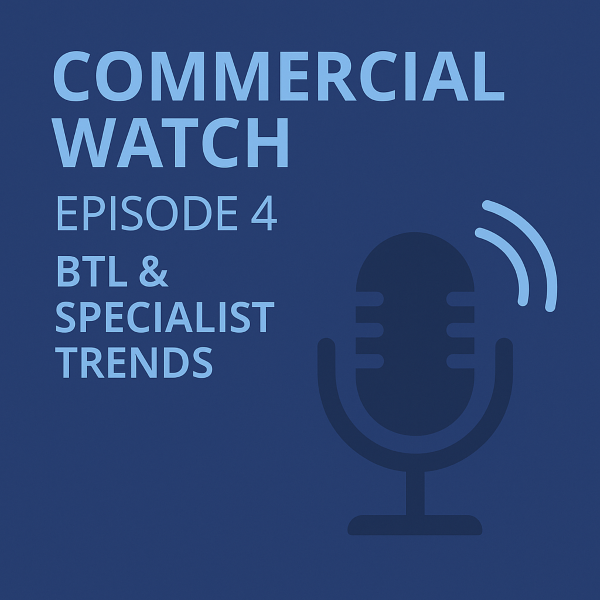We’re now on Commercial Watch Episode 4 of our Commercial Watch series. In the last instalment, we explored the topic of “Understanding Wariness.” This time, we’re turning our attention to a key subject for many advisers: what exactly is a commercial mortgage?
While commercial mortgages are typically linked to properties used for business activity, either owner-occupied or rented to other companies, the definition isn’t always as clear-cut as it appears. Some cases may blur the lines between commercial and super specialist buy-to-let, especially when dealing with semi-commercial properties or complex ownership structures.
Understanding Commercial Mortgages
Commercial properties are typically used by businesses, either by the owner’s company (commercial trading) or rented out to other businesses (commercial investment). In practice, the distinction between these categories can sometimes overlap.
The term commercial mortgage often refers to a wide range of property loans offered by commercial and specialist lenders. Providers such as Shawbrook, Together, and Aldermore apply more flexible lending criteria. Their offerings extend into areas like semi-commercial property, mixed-use developments, and complex buy-to-let cases, often classified as residential investment.
Evolving Options in Commercial Buy-to-Let Lending
Traditionally, mortgage advisers turned to high-street commercial lenders for clients needing higher loan-to-value (LTV) ratios or interest-only terms. Today, the market offers far more flexibility.
Challenger banks like Allica Bank, Shawbrook, and Cynergy have introduced competitive commercial buy-to-let products with broader lending criteria. Many of these lenders now offer higher LTVs than their high-street counterparts, giving advisers greater choice when sourcing solutions for complex client needs.
Loan Size Is Becoming a Key Factor
In the past, advisers would focus on whether clients needed high loan-to-value ratios or interest-only terms. If not, high street commercial lenders often offered competitive rates for standard buy-to-let cases.
That has changed. Even before recent rate increases, commercial mortgage expert Natalie Anderson highlighted the shift: “I placed a great deal with Interbay at 5.29% fixed for five years, while Barclays quoted over 7% for the same term.”
Today, loan size thresholds are a growing challenge in the commercial buy-to-let space.
Earlier this year, Interbay raised its minimum loan size requirement to £1,000,000. While many mainstream lenders technically accept applications from £25,000, they tend to avoid deals under £150,000 in practice. This leaves a gap that super specialist buy-to-let lenders are increasingly stepping in to fill, especially for advisers supporting complex or mid-sized landlord portfolios.
Understanding Lender Appetite in Commercial Buy-to-Let
In the commercial and specialist buy-to-let space, “appetite” is a key concept. Unlike residential or standard buy-to-let mortgages, commercial lending doesn’t follow fixed criteria or a predefined product set. Each lender evaluates cases based on their current interest in particular sectors or property types.
Your success often depends on how well you present the case and how aligned it is with the lender’s preferences. That’s why it’s essential to monitor lender behaviour and market shifts. As economic conditions change, so do lending appetites. Advisers who stay current with these shifts improve their chances of placing complex deals successfully.
Strong relationships with lenders can also be an advantage. When you become a trusted adviser, your cases may receive faster consideration and more flexibility. In commercial lending, deep knowledge and case packaging expertise are essential to achieving the right outcome.
How Commercial Buy-to-Let Differs from Standard Lending
Working in the commercial buy-to-let mortgage sector requires a different approach from traditional residential advice. Many popular sourcing tools are not designed for commercial criteria. While platforms like Business Money Facts and Knowledgebank can help, most brokers rely heavily on their knowledge and experience.
Understanding which lenders are open to specific property types or client profiles can be complex. Commercial mortgage adviser Shannon Harwood points out that, “Banks once had clear lending areas like retail or warehouse units. Now, their approach shifts regularly, so you need to verify each case rather than depend on past patterns.”
This dynamic environment makes sector insight and lender awareness critical for successful case placement.
Accessing Commercial and Specialist Lenders
If you are new to this market, connecting with the right commercial lenders can be difficult. Many institutions, including mainstream banks, restrict their broker panels due to the bespoke nature of underwriting. This often leaves newer or unaccredited advisers without direct access.
Working with a trusted distribution or packaging partner can offer an effective way to gain lender access while building expertise. These partners can help you understand underwriting nuances, grow your case portfolio, and strengthen your professional profile. Over time, this can lead to direct recognition from lenders and broader opportunities.
Learn more about this support model via our Specialist Mortgage Network for Advisers page.
Commercial Lending and Rising Interest Rates
Interest rate fluctuations have changed lender behaviour in the buy-to-let mortgage market. Many commercial providers have moved away from fixed-rate products, opting for pricing that reflects funding costs at the time of drawdown. That said, Shawbrook still offers fixed-rate loans, which makes it a standout lender in this climate.
Keeping up with lender product changes is vital to advising your clients accurately.
Resilience and Opportunity in the Current Market
Although recent economic events, such as the mini-budget, caused temporary disruption, several positive measures have emerged. The expansion of the Seed Enterprise Investment Scheme (SEIS) supports UK startups and investor engagement. Meanwhile, proposed Investment Zones across 38 local authorities promise tax incentives and stamp duty relief for both residential and commercial property development.
While uncertainty remains across financial sectors, demand for mortgage advice continues. Clients still need financing, and lenders are actively adapting their offerings. Innovation is underway, and brokers who continually refine their knowledge will be well-positioned to assist complex or underserved clients.
Thank you for reading our publication “Commercial Watch Episode 4 | An Overview of 2022.” Stay “Connect“-ed for more updates soon

